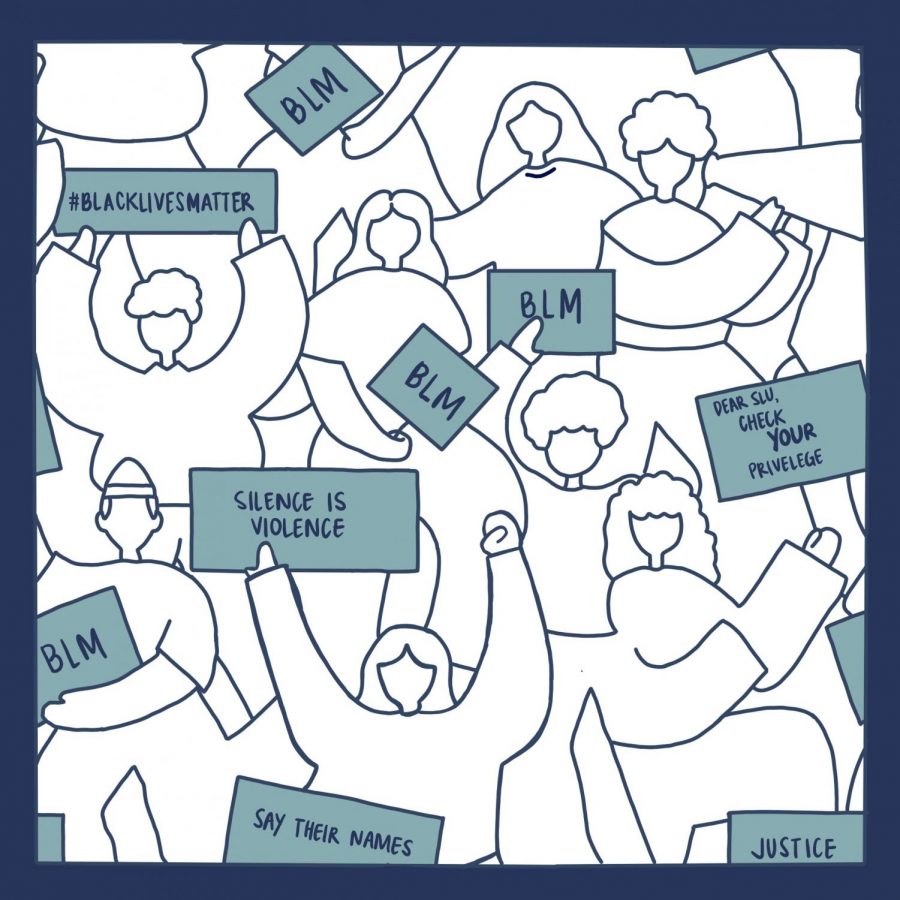SLU and the BLM Movement
Over the course of 2020, there have been several high profile instances of horrific police brutality against Black individuals that have brought the Black Lives Matter (BLM) movement into focus.
While the BLM movement has been around since 2013, originally founded by Alicia Garza, Patrisse Cullors and Opal Tometi in response to the acquittal of Trayvon Martin’s murderer, atrocities have been committed against Black Americans since the establishment of America as a country and continue to happen. It is these injustices that Black Lives Matter seeks to call attention to.
These disturbingly violent and unjustified acts created a lot of momentum for the BLM movement, sparking demonstrations across the country. The mission of BLM, written on their website, is “creating a world free of anti-blackness.” Many institutions and organizations have taken on this mission, SLU included.
In response to the BLM movement, SLU’s staff, faculty, students and administration have begun to make changes to the campus themselves. This response includes adjustments and dialogue to promote inclusion, diversity and equity for the university—as well as trying to support the BLM movement mission to create a campus free of anti-blackness.
Students and faculty members, especially Black individuals and groups at SLU, have been a massive force in effectively addressing the BLM movement and systemic racism here at SLU.
@BlackAtSLU, an instagram account created over this summer, has been a direct tool for Black students, faculty and staff at SLU to voice their experiences with systemic and blatant racism, and to create a dialogue of the current reality for Black individuals. From the Instagram page, a form was created demanding that SLU do more to support their Black students, as well as other students of color.
The BSA, Black Student Alliance, has worked over the summer and into this current semester with the President’s Office to deliver a list of demands for SLU administration, in hopes of the university doing better for their Black students.
“We’ve met with [Dr. Debra Lohe and Dr. Jonathan Smith] multiple times in the summer with a list of demands, we presented that to them, they read it and were very receptive to it, and so now we’ve come back we had our first meeting maybe last week to go over what they’ve added to it what they think can be done quickly, what they think will take further discussion and further definition,” said Taylor Stalling, sophomore and social advocacy chair for BSA.
In the College of Arts and Sciences, there is a social justice task force, composed primarily of department chairs within the college, who will be presenting at the #ScholarStrike on Tuesday Sept. 8, and Wednesday Sept. 9. These same social justice task forces exist in various other colleges and departments within SLU.
“We on the task force have been meeting all summer, and there were various initiatives that were being talked about, more sort of long term. For example, work in the community, doing something with the Reinert center for teaching and learning around decolonizing the curriculum,” said Karla D. Scott, Ph.D., professor in the department of communication and member of the social justice task force in plans for the future.
On Sept. 2, the SLU community was directed to a statement from Jonathan Smith, Ph.D., vice president for the Office of Diversity and Community Engagement, subtitled “A Challenge, a Commitment, and a Call.” In it, he wrote of the systemic racism at SLU and what has been done, as well as what will be done, to effectively address and reform it.
Smith’s message included a reminder of the Clock Tower Accords, as well as details of the initiative to make the African American Studies program into its own fully autonomous department. He also mentioned the Institute for Healing Justice and Equity, Diversity and Community Engagement, which offers diversity, equity and inclusion training, and the THRIVE residential learning community opening this fall for Black and Latinx students.
Going forward, Smith is forming a diverse committee that’s committed to assisting in the vital task of dismantling systemic racism here at SLU and implementing ideas from the BLM movement, as well as carrying out the Clock Tower Accords to make a campus of equity, diversity and inclusion.
“Join me in working to make ours a fully inclusive, equitable, and just community – one in which all of us can be proud,” Smith wrote at the end of his statement.
Although there are actions in motion to address the BLM movement and dismantling systemic racism within SLU, more can certainly be done to achieve this.
“Not to say that there’s no work being done, because there is, but it just hasn’t been completed. I feel like a lot of people feel that it has just taken far too long,” said Stalling.
Many feel that there needs to be more transparency between SLU administration and the rest of campus to ensure SLU is taking concrete action to support the Black community on campus and the BLM movement.
Morgan Mckenny, a freshman, adds on this need for further direct support of BLM and Black SLU members, “More signs, maybe it can be required in some classes to talk about it or read some things about the BLM movement and everything [happening].”
Not only does transparency need to be a priority, but also realistic and efficient methods that have a direct plan to dismantle systemic racism within SLU must be present—specifically from higher administration within SLU.
“I think this is the time for the university and for the upper administration to step up with honestly more than just platitudes and an email,” said Scott on what SLU needs to do to better ensure a fair and anti-racist community for their Black members and other individuals of color. She further added, “I think there should be some structural, systemic, institutional change with resources devoted to, committed to making that change happen.”
SLU owes it to all their students, staff and surrounding community to make a safe and overtly anti-racist environment. Although they are addressing and handling the BLM movement and mission with truth, more can and must be done.
Your donation will support the student journalists of Saint Louis University.





